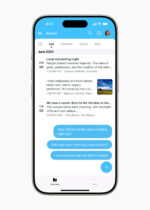The first Apple iPad tablets are scheduled to be delivered to customers, in the U.S. at least, this Saturday, April 3. Those will be the WiFi-equipped versions of the tablet computer. The models with the optional 3G cellular data network transceiver will show up at the end of April.
You may have noticed a lot of buzz about mobile computing recently. Certainly we’ve been focused on it; my Take last week characterized developers writing code for the iPhone/iPad, Android and Windows Phone 7. Not entirely coincidentally, there are several reports on mobile development in the April 1 issue of SD Times, discussing Mono on Android, the Wholesale Applications Community and the Rhodes framework for Ruby.
It’s not just SD Times. Mobile mania is everywhere, from Oracle’s software developer forums to The New York Times.
However, when it comes to managing the list of projects facing an enterprise software development department, many coders and managers may be asking, “Who cares? We’re not writing any mobile apps.”
Mobile devices—whether phones or tablets—are an important platform, and are distinct from desktops, servers and the emerging Cloud. Certainly not every company needs to build mobile apps, and not every project lends itself to mobility.
If you’re writing code to automate back-end business processes, or crafting glue code for a silo integration project, or designing algorithms for scheduling aircraft departures, you can safely ignore the Android-vs.-iPhone question. Unless you’re playing with the presentation layer, mobility doesn’t apply.
If you are working in the presentation layer, though, mobility is increasingly important. Obviously, a little iPhone or Windows Phone 7 app isn’t going to replace a full-featured native or AJAX application running on a corporate desktop. Within the enterprise, many or most use cases will continue to fit exclusively onto a standard desktop or notebook computer.
For a swivel-chair information worker or an employee at a dedicated task station (like an airline check-in counter, factory floor workstation or a cash register), the iPad need not apply.
So, yes, not every developer cares about mobility, at least not during his or her 9-to-5 job. We acknowledge that. But that knowledge doesn’t dampen our enthusiasm for mobility, however. April 3 can’t come soon enough.
Alan Zeichick is editorial director of SD Times. Follow him on Twitter at twitter.com/zeichick. Read his blog at ztrek.blogspot.com.






